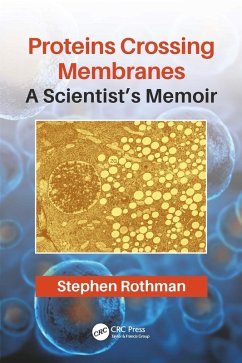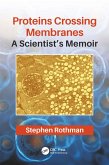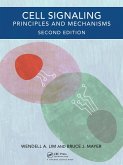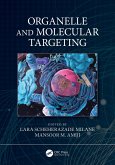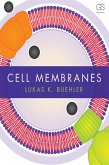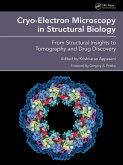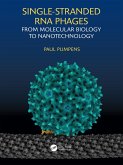59,95 €
59,95 €
inkl. MwSt.
Sofort per Download lieferbar

30 °P sammeln
59,95 €
Als Download kaufen

59,95 €
inkl. MwSt.
Sofort per Download lieferbar

30 °P sammeln
Jetzt verschenken
Alle Infos zum eBook verschenken
59,95 €
inkl. MwSt.
Sofort per Download lieferbar
Alle Infos zum eBook verschenken

30 °P sammeln
- Format: ePub
- Merkliste
- Auf die Merkliste
- Bewerten Bewerten
- Teilen
- Produkt teilen
- Produkterinnerung
- Produkterinnerung

Bitte loggen Sie sich zunächst in Ihr Kundenkonto ein oder registrieren Sie sich bei
bücher.de, um das eBook-Abo tolino select nutzen zu können.
Hier können Sie sich einloggen
Hier können Sie sich einloggen
Sie sind bereits eingeloggt. Klicken Sie auf 2. tolino select Abo, um fortzufahren.

Bitte loggen Sie sich zunächst in Ihr Kundenkonto ein oder registrieren Sie sich bei bücher.de, um das eBook-Abo tolino select nutzen zu können.
The vesicle theory of protein secretion is meant to explain the manner by which proteins, once generated, are encapsulated, transported, and secreted by cells. This book explains the author's findings, which critique the theory, and is a personal narrative of the resistence his views experienced among proponents of the theory.
- Geräte: eReader
- mit Kopierschutz
- eBook Hilfe
- Größe: 2.55MB
Andere Kunden interessierten sich auch für
![Proteins Crossing Membranes (eBook, PDF) Proteins Crossing Membranes (eBook, PDF)]() Stephen RothmanProteins Crossing Membranes (eBook, PDF)59,95 €
Stephen RothmanProteins Crossing Membranes (eBook, PDF)59,95 €![Cell Signaling, 2nd edition (eBook, ePUB) Cell Signaling, 2nd edition (eBook, ePUB)]() Wendell A. LimCell Signaling, 2nd edition (eBook, ePUB)90,95 €
Wendell A. LimCell Signaling, 2nd edition (eBook, ePUB)90,95 €![Organelle and Molecular Targeting (eBook, ePUB) Organelle and Molecular Targeting (eBook, ePUB)]() Organelle and Molecular Targeting (eBook, ePUB)48,95 €
Organelle and Molecular Targeting (eBook, ePUB)48,95 €![Cell Membranes (eBook, ePUB) Cell Membranes (eBook, ePUB)]() Lukas BuehlerCell Membranes (eBook, ePUB)61,95 €
Lukas BuehlerCell Membranes (eBook, ePUB)61,95 €![Cryo-Electron Microscopy in Structural Biology (eBook, ePUB) Cryo-Electron Microscopy in Structural Biology (eBook, ePUB)]() Cryo-Electron Microscopy in Structural Biology (eBook, ePUB)186,95 €
Cryo-Electron Microscopy in Structural Biology (eBook, ePUB)186,95 €![The Nuclear Envelope (eBook, ePUB) The Nuclear Envelope (eBook, ePUB)]() The Nuclear Envelope (eBook, ePUB)162,95 €
The Nuclear Envelope (eBook, ePUB)162,95 €![Single-stranded RNA phages (eBook, ePUB) Single-stranded RNA phages (eBook, ePUB)]() Paul PumpensSingle-stranded RNA phages (eBook, ePUB)47,95 €
Paul PumpensSingle-stranded RNA phages (eBook, ePUB)47,95 €-
-
-
The vesicle theory of protein secretion is meant to explain the manner by which proteins, once generated, are encapsulated, transported, and secreted by cells. This book explains the author's findings, which critique the theory, and is a personal narrative of the resistence his views experienced among proponents of the theory.
Dieser Download kann aus rechtlichen Gründen nur mit Rechnungsadresse in A, B, BG, CY, CZ, D, DK, EW, E, FIN, F, GR, HR, H, IRL, I, LT, L, LR, M, NL, PL, P, R, S, SLO, SK ausgeliefert werden.
Produktdetails
- Produktdetails
- Verlag: Taylor & Francis eBooks
- Seitenzahl: 248
- Erscheinungstermin: 17. Januar 2019
- Englisch
- ISBN-13: 9780429665189
- Artikelnr.: 55042084
- Verlag: Taylor & Francis eBooks
- Seitenzahl: 248
- Erscheinungstermin: 17. Januar 2019
- Englisch
- ISBN-13: 9780429665189
- Artikelnr.: 55042084
- Herstellerkennzeichnung Die Herstellerinformationen sind derzeit nicht verfügbar.
Stephen Rothman is an Emeritus Professor of Physiology at the University of California, San Francisco. He has written three books devoted to the topic of limitations of the reductionist scientific enterprise in biology. Lessons from the Living Cell: The Limits of Reductionism (2002), was an evaluation of reductionism as a research strategy. Life Beyond Molecules and Genes: How our Adaptations Make us Alive (2009), was about reductionism as a means of explaining life, of determining whether something is living. And, The Paradox of Evolution: The Strange Relationship between Natural Selection and Reproduction (2015), discusses the adequacy of reductionism as an instrument of description for evolution. All three are unusual in that they concern points of view that many think are well settled. This new book deals with the vesicle theory, which explains the basic structure and function of cells, but about which there remain reasons to doubt. Rothman studied at the University of Pennsylvania in the 1950s and subsequently taught and carried out research as a professor at Harvard Medical School. From the early 1970's until his retirement he was a professor at the University of California, San Francisco. His research covered a wide range of topics from molecular to whole-animal biology. He and his colleagues published some 200 articles in scientific journals including Nature and Science. As a senior member of the faculty at two of the most prominent medical schools in the world, he was most well known for his pioneering studies on the transport of protein molecules across biological membranes. During the 1980s, he was responsible for developing life-science activities for a synchrotron at Lawrence Berkeley Laboratory. He founded and served as CEO, CSO and Chairman of the Board of Genteric Corporation, a small biotechnology company in the Bay Area that pursued innovative methods of gene therapy.
Preface. Praeludium. SECTION I: INTIMATIONS AND FOREBODINGS. Chapter 1: At the Bench
Watching and Learning. Chapter 2: An Indifferent Student
Of Clams and Starfish. Chapter 3: The Dark in the Window
The Real Thing. Chapter 4: The Observant Dr. Pavlov
Digestion, Saliva and Hormones. SECTION II: ON THE VERISIMILITUDE OF SIMULACRA. Chapter 5: The Structures
The Cell Seen in the Electron Microscope. Chapter 6: Micro
vesicles
Imagining Tiny Goings
on. Chapter 7: Secretion
Granules Popping out of Cells. Chapter 8: To See, We Must Transform
What Are You Really Looking At? Chapter 9: Making Things Whole
To Get Beyond Speculation. Chapter 10: The Search for Dynamics
The Theory Examines Itself. Chapter 11: Location, location, location
Where Am I? Chapter 12: Making the Impossible Real
Could the Impossible, Be Possible? SECTION III: NATURE'S WAY. Chapter 13: Testing the Theory
Testing The Already Known. Chapter 14: Ring the Tocsin
Into the Fray. Chapter 15: The Clarion Call
The Impossible Takes Place. Chapter 16: The Membrane Revolution
When is a Revolution not a Revolution? Chapter 17: The Case of the Disappearing Granules
Extraordinary Evidence. Chapter 18: What Just Happened?
What Didn't Happen. Chapter 19: Irreversible
The One
way Street. Chapter 20: Resurrection
The Report of Death was Premature. Chapter 21: Pandora's Box and the Back Door
Now Look What you Have Done! SECTION IV: REIFICATION AND ATTITUDES. Chapter 22: Expunging Heterodoxy
No you don't! Chapter 23: The Visit
The Unwelcome Guests. Chapter 24: Rejuvenation
What now? Chapter 25: The Impossibility of It All
On the Coherence of Theory. Chapter 26: The Complexity Excuse
Avoiding Ockham's Razor. Chapter 27: Beliefs
The Beliefs of Scientists. Chapter 28: The Rise of the Careerist
Science as a profession. Chapter 29: Cronyism
Politics in the World of Science. Chapter 30: Psyche
Why Me? Chapter 31: Carved in Stone
Dogma. ACKNOWLEDGEMENTS. NOTES AND SELECTED READINGS
Watching and Learning. Chapter 2: An Indifferent Student
Of Clams and Starfish. Chapter 3: The Dark in the Window
The Real Thing. Chapter 4: The Observant Dr. Pavlov
Digestion, Saliva and Hormones. SECTION II: ON THE VERISIMILITUDE OF SIMULACRA. Chapter 5: The Structures
The Cell Seen in the Electron Microscope. Chapter 6: Micro
vesicles
Imagining Tiny Goings
on. Chapter 7: Secretion
Granules Popping out of Cells. Chapter 8: To See, We Must Transform
What Are You Really Looking At? Chapter 9: Making Things Whole
To Get Beyond Speculation. Chapter 10: The Search for Dynamics
The Theory Examines Itself. Chapter 11: Location, location, location
Where Am I? Chapter 12: Making the Impossible Real
Could the Impossible, Be Possible? SECTION III: NATURE'S WAY. Chapter 13: Testing the Theory
Testing The Already Known. Chapter 14: Ring the Tocsin
Into the Fray. Chapter 15: The Clarion Call
The Impossible Takes Place. Chapter 16: The Membrane Revolution
When is a Revolution not a Revolution? Chapter 17: The Case of the Disappearing Granules
Extraordinary Evidence. Chapter 18: What Just Happened?
What Didn't Happen. Chapter 19: Irreversible
The One
way Street. Chapter 20: Resurrection
The Report of Death was Premature. Chapter 21: Pandora's Box and the Back Door
Now Look What you Have Done! SECTION IV: REIFICATION AND ATTITUDES. Chapter 22: Expunging Heterodoxy
No you don't! Chapter 23: The Visit
The Unwelcome Guests. Chapter 24: Rejuvenation
What now? Chapter 25: The Impossibility of It All
On the Coherence of Theory. Chapter 26: The Complexity Excuse
Avoiding Ockham's Razor. Chapter 27: Beliefs
The Beliefs of Scientists. Chapter 28: The Rise of the Careerist
Science as a profession. Chapter 29: Cronyism
Politics in the World of Science. Chapter 30: Psyche
Why Me? Chapter 31: Carved in Stone
Dogma. ACKNOWLEDGEMENTS. NOTES AND SELECTED READINGS
Preface. Praeludium. SECTION I: INTIMATIONS AND FOREBODINGS. Chapter 1: At the Bench
Watching and Learning. Chapter 2: An Indifferent Student
Of Clams and Starfish. Chapter 3: The Dark in the Window
The Real Thing. Chapter 4: The Observant Dr. Pavlov
Digestion, Saliva and Hormones. SECTION II: ON THE VERISIMILITUDE OF SIMULACRA. Chapter 5: The Structures
The Cell Seen in the Electron Microscope. Chapter 6: Micro
vesicles
Imagining Tiny Goings
on. Chapter 7: Secretion
Granules Popping out of Cells. Chapter 8: To See, We Must Transform
What Are You Really Looking At? Chapter 9: Making Things Whole
To Get Beyond Speculation. Chapter 10: The Search for Dynamics
The Theory Examines Itself. Chapter 11: Location, location, location
Where Am I? Chapter 12: Making the Impossible Real
Could the Impossible, Be Possible? SECTION III: NATURE'S WAY. Chapter 13: Testing the Theory
Testing The Already Known. Chapter 14: Ring the Tocsin
Into the Fray. Chapter 15: The Clarion Call
The Impossible Takes Place. Chapter 16: The Membrane Revolution
When is a Revolution not a Revolution? Chapter 17: The Case of the Disappearing Granules
Extraordinary Evidence. Chapter 18: What Just Happened?
What Didn't Happen. Chapter 19: Irreversible
The One
way Street. Chapter 20: Resurrection
The Report of Death was Premature. Chapter 21: Pandora's Box and the Back Door
Now Look What you Have Done! SECTION IV: REIFICATION AND ATTITUDES. Chapter 22: Expunging Heterodoxy
No you don't! Chapter 23: The Visit
The Unwelcome Guests. Chapter 24: Rejuvenation
What now? Chapter 25: The Impossibility of It All
On the Coherence of Theory. Chapter 26: The Complexity Excuse
Avoiding Ockham's Razor. Chapter 27: Beliefs
The Beliefs of Scientists. Chapter 28: The Rise of the Careerist
Science as a profession. Chapter 29: Cronyism
Politics in the World of Science. Chapter 30: Psyche
Why Me? Chapter 31: Carved in Stone
Dogma. ACKNOWLEDGEMENTS. NOTES AND SELECTED READINGS
Watching and Learning. Chapter 2: An Indifferent Student
Of Clams and Starfish. Chapter 3: The Dark in the Window
The Real Thing. Chapter 4: The Observant Dr. Pavlov
Digestion, Saliva and Hormones. SECTION II: ON THE VERISIMILITUDE OF SIMULACRA. Chapter 5: The Structures
The Cell Seen in the Electron Microscope. Chapter 6: Micro
vesicles
Imagining Tiny Goings
on. Chapter 7: Secretion
Granules Popping out of Cells. Chapter 8: To See, We Must Transform
What Are You Really Looking At? Chapter 9: Making Things Whole
To Get Beyond Speculation. Chapter 10: The Search for Dynamics
The Theory Examines Itself. Chapter 11: Location, location, location
Where Am I? Chapter 12: Making the Impossible Real
Could the Impossible, Be Possible? SECTION III: NATURE'S WAY. Chapter 13: Testing the Theory
Testing The Already Known. Chapter 14: Ring the Tocsin
Into the Fray. Chapter 15: The Clarion Call
The Impossible Takes Place. Chapter 16: The Membrane Revolution
When is a Revolution not a Revolution? Chapter 17: The Case of the Disappearing Granules
Extraordinary Evidence. Chapter 18: What Just Happened?
What Didn't Happen. Chapter 19: Irreversible
The One
way Street. Chapter 20: Resurrection
The Report of Death was Premature. Chapter 21: Pandora's Box and the Back Door
Now Look What you Have Done! SECTION IV: REIFICATION AND ATTITUDES. Chapter 22: Expunging Heterodoxy
No you don't! Chapter 23: The Visit
The Unwelcome Guests. Chapter 24: Rejuvenation
What now? Chapter 25: The Impossibility of It All
On the Coherence of Theory. Chapter 26: The Complexity Excuse
Avoiding Ockham's Razor. Chapter 27: Beliefs
The Beliefs of Scientists. Chapter 28: The Rise of the Careerist
Science as a profession. Chapter 29: Cronyism
Politics in the World of Science. Chapter 30: Psyche
Why Me? Chapter 31: Carved in Stone
Dogma. ACKNOWLEDGEMENTS. NOTES AND SELECTED READINGS
